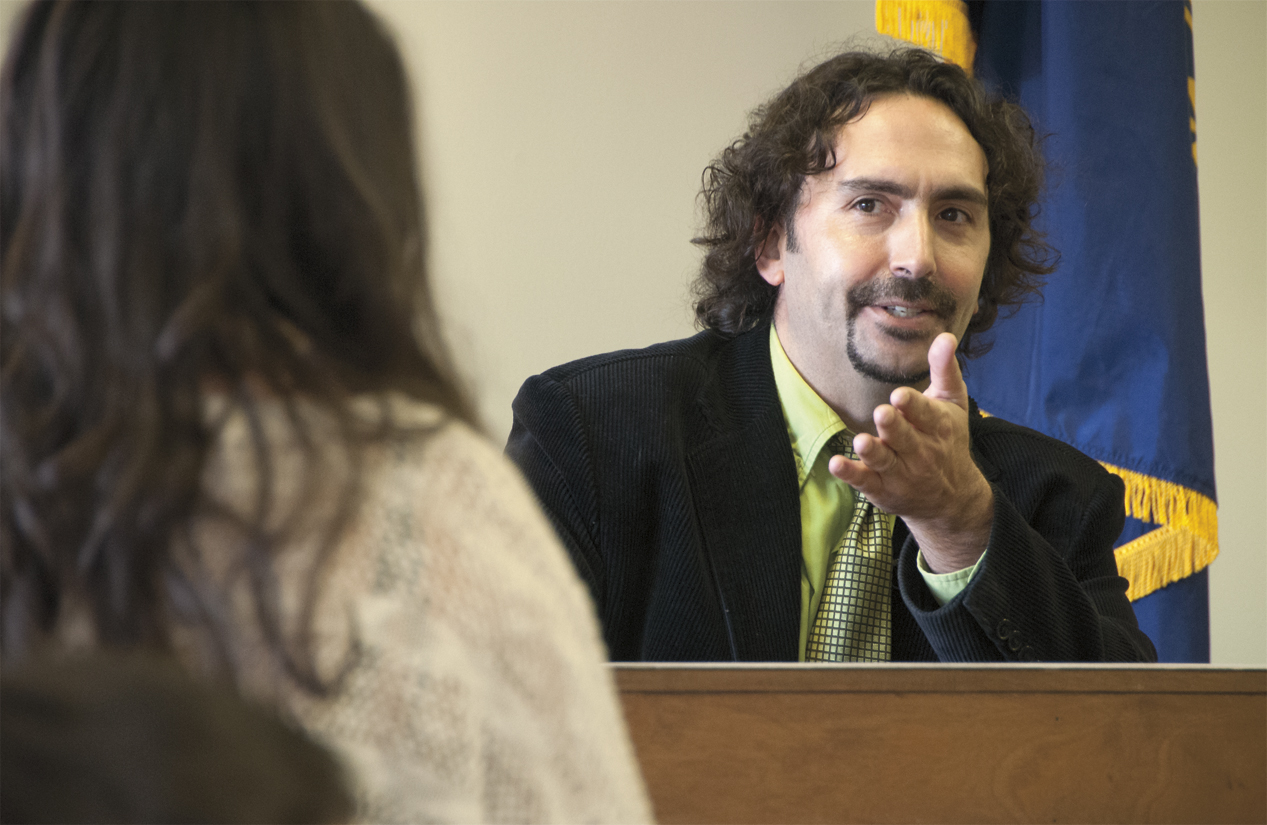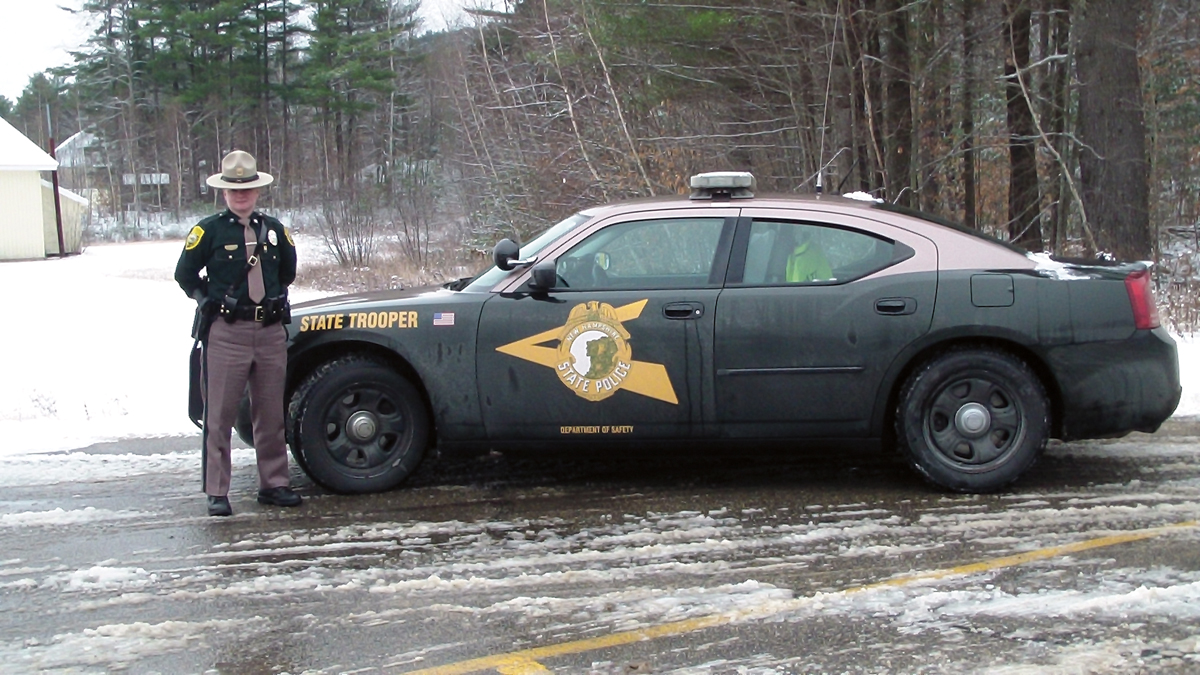In September 2003, Plymouth State University launched its criminal justice program with 45 students and two faculty members: Professor of Business and Criminal Justice David Kent (now professor emeritus), who developed the program, and Professor of Criminal Justice Mark Fischler, who had recently joined the faculty at PSU after working as a practicing defense attorney with the New Hampshire Public Defender.
The goal of the program was to fill a critical need in central New Hampshire and beyond: to provide a criminal justice degree that was geared toward service, and whose graduates would serve with compassion and a willingness to help.
In just over a decade, the criminal justice program at PSU has flourished, with more than 300 majors and a large and diverse faculty comprising current and former attorneys, judges, police officers, parole officers, prison wardens, sociologists, and well-respected researchers. “We have a committed faculty that cares about students and treats them like family,” says Fischler. He notes that the faculty’s diverse background gives students “a well-rounded exposure to the criminal justice system that allows them to find a place where they can make a difference.”
Professor Francis Williams, who began teaching after a distinguished, 26-year career as a criminal justice professional, agrees. “We are an engaged faculty with our own individual research interests and experiences. What we have in common is a devotion to providing a learning environment for our students that allows them to challenge themselves and succeed academically and in their future careers.”

“We have a committed faculty that cares about students and treats them like family,” says Professor Mark Fischler, chair of the criminal justice department. Jeremy Gasowski ’01 photo.
The Curriculum
The Bachelor of Arts in Criminal Justice prepares students for careers throughout the criminal justice system, including law enforcement, law, court administration, government, criminology, corrections and probation, and careers working with juveniles. In addition to acquiring skills and knowledge in areas such as forensic science, criminology, ethics and law, research methods, corrections, and criminal justice technology, students also acquire a strong liberal arts foundation that helps them develop skills in problem solving, communication and writing, and interpersonal relations. “Criminal justice is a people business,” says Kent, who is also a judge with the Plymouth Circuit Court. “You need strong communication skills and interpersonal skills to work in this field.”
As Fischler points out, the degree offers more than the acquisition of practical skills. “We value a liberal arts education and the deeper world views that are developed when you study through the lens of a liberal arts education,” he says. “It’s a great benefit to our students who will go on to enforce the law, interpret the law, work in corrections, and serve people within the system.”
Walk into any criminal justice classroom, and you won’t see a faculty member lecturing while students diligently take notes. Rather, active student participation is expected, and the students wouldn’t have it any other way. “We often get into some exciting discussions and debates in class that make me want to read more, learn more, and investigate certain topics further,” says Charles DeJoie ’14. “Every class is interactive and collaborative, which has helped me become a stronger speaker and more confident in sharing my point of view.”
Faculty members often invite guest speakers to talk to their classes. “Bringing professionals into the classroom to present to students, share their real-world experience and insights, and answer questions is invaluable to our students’ learning,” says Williams, who also shares his own experiences in law enforcement, security administration, and probation with his students. Not only do these talks reinforce classroom learning, he says, but they also give students an idea of the kinds of careers available within the field of criminal justice.
Hands-On Learning
Like all majors at PSU, criminal justice students engage in experiential learning to supplement what they’re learning in class. From observing hearings and interviewing attorneys and judges at the Plymouth District Court to developing the skills necessary to maintain and analyze criminal evidence, criminal justice majors have rich and varied hands-on learning opportunities to choose from.
In Fischler’s Criminal Adjudication course, for example, students fill out search warrants and arresting affidavits, and put their classroom knowledge, communication skills, and critical thinking skills to the test by staging mock bail hearings, plea negotiations, and cross-examinations.
In Professor Stephanie Halter’s ’02 Research Methods class, students learn to become better consumers of research and create their own surveys. Some of Halter’s students are currently working on a service-learning project in which they are developing a survey for the Plymouth Mental Health Court, a program that seeks to provide an effective and meaningful alternative to the traditional criminal justice system for individuals with mental illness. The aim of the survey is to measure program participants’ success in complying with court orders, such as participation in counseling, drug or alcohol treatment, or finding employment. The survey will also measure participant recidivism as well as the participant satisfaction with the program.
“Students will have the opportunity to sit in on hearings and interact with the program staff to learn more about program goals and objectives, then develop the survey,” says Halter, whose doctoral dissertation on how juveniles involved in prostitution were conceptualized by police as victims or offenders earned the American Professional Society on the Abuse of Children’s Award for Outstanding Doctoral Dissertation in 2009.
Research
Research is a central part of Plymouth State’s mission and a reflection of the University’s values and guiding principles. Many of the faculty members in the criminal justice department engage in scholarly research that they share with their students, not only to augment classroom learning, but also to inspire them to discover their own passion for research.
Halter acknowledges that many of her students don’t immediately recognize the value of research to careers in criminal justice. Her most compelling argument is her own outside research endeavors, one of which is conducting evaluation research for the Court Improvement Project, a statewide initiative that seeks to improve the court experience for abused and neglected children.
“Evaluation is a key part of the criminal justice system, and I am paid very well to do evaluation research, because many agencies don’t know how to do it themselves,” Halter says. “They are spending taxpayer dollars on programs and they need to make sure these programs are effective. I tell my students that if they don’t learn these skills, they should be prepared to pay a consultant about 10 percent of their program’s budget someday, because that’s what it costs for an evaluation.”
Professor Kristine Levan’s research focuses on criminal violence and institutional corrections, in particular prison sexual assault and how it impacts individuals in the long term and how they take those experiences with them when they’re released back out into the community. Prison inmates, says Levan, “are being released from prison with sexually transmitted diseases, rape trauma syndrome, hostility, anger, fear, and depression, and they’re continuing that cycle of violence and victimization in the community or at home. We need to put the ‘correcting’ back in ‘corrections.’”
Like many of her colleagues in the criminal justice department, Levan’s research is widely published in journal articles, books, and textbooks. Her most recent article, featured in Justice Quarterly, focuses on perceptions that male inmates have about sexual victimization and why they don’t report it, versus why people in the community don’t report sexual victimization. Other articles have analyzed media depictions of sexual violence in the prison system.
In 2011, Levan and her PSU colleague Professor of Criminal Justice David Mackey collaborated on Crime Prevention, a textbook that is being used in crime prevention classes and criminology classes nationwide. She followed this up with 2012’s Prison Violence: Causes, Consequences, and Solutions, a comprehensive analysis of prison violence on national and international levels.
Internships
Internships give students the opportunity to explore career options, develop skills, and network with professionals while applying what they’ve learned to the real world. Criminal justice majors with a grade point average of 3.0 and higher are eligible for internships beginning their junior year. Students have interned at the US Marshal’s Office, the state attorney general’s office, in juvenile probation and parole, and in police departments throughout the region. “Internships allow you to engage in hands-on learning that can help shape your interest in a specific area of the field, or in a specific profession,” says Penina Wallace ’13. “I did two internships, one with a criminal defense law firm and the other with a nonprofit drug abuse prevention program.”
While Wallace found both of her internships interesting, it was her internship with the law firm that showed her where her interests lie. “I was going to court, doing research, interviewing clients, and experiencing the daily activities of a lawyer. It helped me develop an understanding, while still a student, of what being a lawyer would entail, and I loved it,” says Wallace, who is now in her first year of law school at UNH Law.
“An internship is just as successful if you find out what you do not want to do,” says Fischler. “That’s just as helpful an experience, if not more so.”
Amanda Johnson ’08 knew exactly what she wanted to do with her criminal justice degree. “My goal was to become a New Hampshire state trooper after graduation,” she says. The experience she gained and the contacts she made during her internship helped her do just that. “I completed an internship with the Plymouth area prosecutor’s office, and not only was the experience invaluable in terms of exposing me to the complex criminal justice process from courtroom formalities to legal processes, but it also provided me with an opportunity to network with professionals in the field. At the conclusion of my education at Plymouth State, I had built relationships with mentors and supervisors that helped me secure employment.”

New Hampshire State Trooper Amanda Johnson ’08 serves rural towns in the northern half of New Hampshire.
As a New Hampshire state trooper, Johnson’s responsibilities include enforcing motor vehicle laws and investigating criminal offenses including violations, misdemeanors, and felony-level crimes. She is assigned to Troop F, which primarily serves rural towns in the northern half of New Hampshire—towns that don’t have fully staffed police departments, or any police departments at all. “The state police take on the primary law enforcement duties for these towns,” she says.
In the decade since the Department of Criminal Justice was formed, the program has produced well-educated graduates who go on to rewarding careers in law, law enforcement, corrections, and more. In fall 2014, PSU aims to launch the Master of Science in Criminal Justice Administration, which will help prepare professionals for leadership roles in law enforcement.
While PSU’s criminal justice alumni embark on a wide variety of careers, what they share is a high-quality educational foundation and connections with committed and caring faculty mentors that endure long after graduation. ~ Barbra Alan
Tags: BA in Criminal Justice Criminal Justice David Kent David Mackey Francis Williams Kristine Levan Mark Fischler Stephanie Halter












